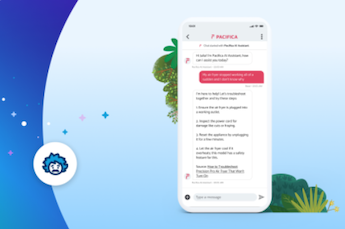 Salesforce recently unveiled the Einstein Service Agent, a new fully autonomous AI agent that represents an important step in the accelerated adoption of large language models (LLMs) across business functions. The cross-channel AI agent includes a Generative AI (GenAI) conversational frontend that offers a more dynamic and intelligent interaction far exceeding the capabilities of previous chatbots.
Salesforce recently unveiled the Einstein Service Agent, a new fully autonomous AI agent that represents an important step in the accelerated adoption of large language models (LLMs) across business functions. The cross-channel AI agent includes a Generative AI (GenAI) conversational frontend that offers a more dynamic and intelligent interaction far exceeding the capabilities of previous chatbots.
Built on the Einstein 1 Platform, Einstein Service Agents act as a trusted team member to help understand customer intents and troubleshoot potential problems. It generates conversational responses tailored to a company’s brand voice and guidelines. Einstein Service Agents can define actions and autonomously determine the next steps to generate workflows. Applications include delivering improved, personalized experiences, leveraging seamless human-bot transitions, or identifying upsell opportunities for revenue generation.
The introduction of Einstein Service Agent underscores Salesforce’s commitment to leveraging generative AI, despite ongoing debates and concerns about the potential pitfalls and dangers of using Gen AI in customer-facing roles.
Key Features of Einstein Service Agent
Contextual Understanding and Action: Unlike its predecessors, Einstein Service Agent leverages the pre-trained power of LLMs to analyze the context and nuances of customer inquiries, enabling it to handle a wide range of service issues without the need for extensive preprogramming. This ensures customers receive accurate and timely responses.
Integration with Trusted Business Data: Grounded in a company’s trusted business data, including Salesforce CRM data, Einstein Service Agent generates responses that are not only accurate but also aligned with the customer’s specific needs and preferences. This integration extends to third-party systems, further enhancing the agent’s capabilities.
Proactive and Continuous Availability: Operating 24/7, Einstein Service Agent is always ready to assist customers across various self-service portals and messaging channels. It can perform tasks proactively, ensuring swift resolutions and seamless customer experiences.
Quick Setup and Customization: Setting up Einstein Service Agent is designed to be user-friendly, with pre-built templates and low-code actions and workflows. Companies can leverage existing Salesforce objects to equip the agent with specific skills, reducing the time and cost associated with deployment.
Built-in Guardrails: The Einstein 1 Platform includes robust guardrails to ensure safe and appropriate AI interactions. This includes masking personally identifiable information (PII) and defining clear operational parameters for the AI agent.
Seamless Handoff to Human Agents: For complex or sensitive issues, Einstein Service Agent can quickly escalate the conversation to a human agent. This handoff is designed to be smooth, with the human agent having full context of the previous interaction, thus avoiding the need for customers to repeat themselves.
The Courage to Innovate
Salesforce’s decision to introduce Einstein Service Agent reflects a bold move in the face of widespread FUD (fear, uncertainty, and doubt) surrounding the use of generative AI in customer service. By pushing forward with this technology, Salesforce demonstrates confidence in its ability to enhance customer experiences while addressing the limitations of traditional chatbots.
Studies indicate that while many companies currently use chatbots, a significant majority of customers prefer speaking to live agents due to the inadequacies of current chatbot technology. However, there is also a clear demand for more intelligent and autonomous self-service options. Einstein Service Agent aims to bridge this gap, offering a solution that can handle routine inquiries efficiently while allowing human agents to focus on more complex tasks. It utilizes guardrails and knowledge-based answers to mitigate the risks of rogue behavior and hallucinations.
Categories: Conversational Intelligence, Intelligent Assistants, Articles

 Getting It Right: What AI Agents Actually Mean for Customer Support (Webinar)
Getting It Right: What AI Agents Actually Mean for Customer Support (Webinar)  Beyond the Basics: How AI Is Transforming B2B Sales at TP
Beyond the Basics: How AI Is Transforming B2B Sales at TP  Five9 Launches Agentic CX: Toward AI Agents That Reason and Act
Five9 Launches Agentic CX: Toward AI Agents That Reason and Act  2025 Conversational AI Intelliview: Decision-Makers Guide to Self-Service & Enterprise Intelligent Assistants
2025 Conversational AI Intelliview: Decision-Makers Guide to Self-Service & Enterprise Intelligent Assistants